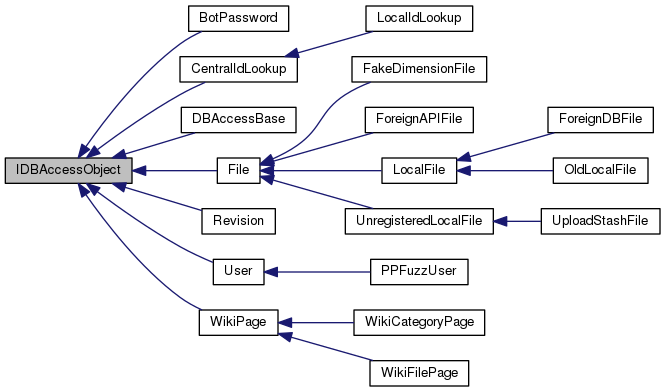Interface for database access objects. More...

Public Attributes | |
| const | READ_EXCLUSIVE = 7 |
| const | READ_LATEST = 1 |
| const | READ_LOCKING = 3 |
| const | READ_NONE = -1 |
| const | READ_NORMAL = 0 |
Detailed Description
Interface for database access objects.
Classes using this support a set of constants in a bitfield argument to their data loading functions. In general, objects should assume READ_NORMAL if no flags are explicitly given, though certain objects may assume READ_LATEST for common use case or legacy reasons.
There are four types of reads:
- READ_NORMAL : Potentially cached read of data (e.g. from a slave or stale replica)
- READ_LATEST : Up-to-date read as of transaction start (e.g. from master or a quorum read)
- READ_LOCKING : Up-to-date read as of now, that locks (shared) the records
- READ_EXCLUSIVE : Up-to-date read as of now, that locks (exclusive) the records All record locks persist for the duration of the transaction.
Callers should use READ_NORMAL (or pass in no flags) unless the read determines a write. In theory, such cases may require READ_LOCKING, though to avoid contention, READ_LATEST is often good enough. If UPDATE race condition checks are required on a row and expensive code must run after the row is fetched to determine the UPDATE, it may help to do something like:
- a) Read the current row
- b) Determine the new row (expensive, so we don't want to hold locks now)
- c) Re-read the current row with READ_LOCKING; if it changed then bail out
- d) otherwise, do the updates
- Since
- 1.20
Definition at line 49 of file IDBAccessObject.php.
Member Data Documentation
| const IDBAccessObject::READ_EXCLUSIVE = 7 |
Definition at line 53 of file IDBAccessObject.php.
Referenced by DBAccessObjectUtils\getDBOptions().
| const IDBAccessObject::READ_LATEST = 1 |
Definition at line 51 of file IDBAccessObject.php.
Referenced by EmailConfirmation\attemptConfirm(), EmailInvalidation\attemptInvalidate(), MediaWiki\Auth\AuthManager\autoCreateUser(), NamespaceConflictChecker\canMerge(), UploadBase\checkWarnings(), WikiPage\commitRollback(), Article\delete(), MovePageForm\doSubmit(), ApiSetNotificationTimestamp\execute(), ApiEditPage\execute(), FileRepo\findFile(), DBAccessObjectUtils\getDBOptions(), SearchUpdate\getLatestPage(), WikiRevision\importUpload(), BotPassword\invalidateAllPasswordsForUser(), InfoAction\invalidateCache(), MovePage\isValidFileMove(), MovePage\isValidMoveTarget(), Title\isValidMoveTarget(), WikiPage\loadLastEdit(), MovePage\move(), CategoryMembershipChange\notifyCategorization(), CategoryMembershipChangeJob\notifyUpdatesForRevision(), UploadBase\performUpload(), WikiPage\prepareContentForEdit(), BotPassword\removeAllPasswordsForUser(), ThumbnailRenderJob\run(), DeleteLinksJob\run(), CategoryMembershipChangeJob\run(), DoubleRedirectJob\run(), RefreshLinksJob\runForTitle(), CentralIdLookupTest\testCentralIdFromLocalUser(), CentralIdLookupTest\testCentralIdFromName(), CentralIdLookupTest\testLocalUserFromCentralId(), CentralIdLookupTest\testNameFromCentralId(), BotPasswordTest\testSave(), PageArchive\undelete(), and Title\validateFileMoveOperation().
| const IDBAccessObject::READ_LOCKING = 3 |
Definition at line 52 of file IDBAccessObject.php.
Referenced by MediaWiki\Auth\AuthManager\beginAccountCreation(), MediaWiki\Auth\AuthManager\continueAccountCreation(), DBAccessObjectUtils\getDBOptions(), WikiPage\loadLastEdit(), and MovePage\moveToInternal().
| const IDBAccessObject::READ_NONE = -1 |
Definition at line 59 of file IDBAccessObject.php.
| const IDBAccessObject::READ_NORMAL = 0 |
Definition at line 56 of file IDBAccessObject.php.
Referenced by MediaWiki\Auth\AuthManager\autoCreateUser(), Article\delete(), ResourceLoaderWikiModule\getContent(), LocalFile\getDescriptionText(), Skin\getNewtalks(), Skin\getRelevantUser(), SearchResult\initFromTitle(), DifferenceEngine\loadRevisionData(), and SpecialBookSources\showList().
The documentation for this interface was generated from the following file:
- includes/dao/IDBAccessObject.php
